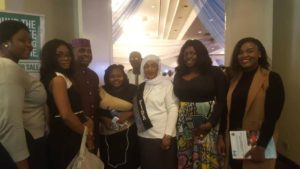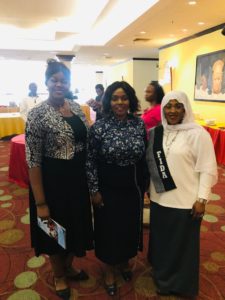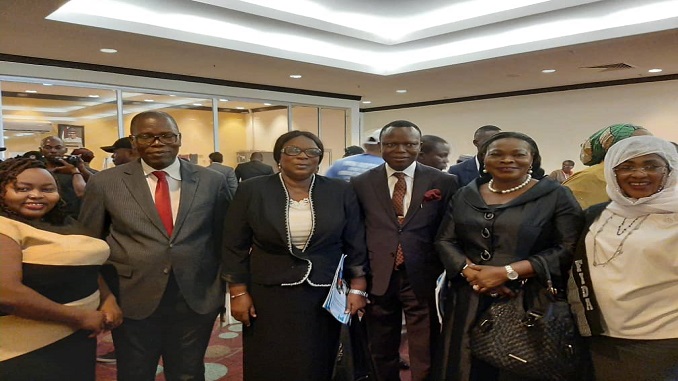… say trafficking in persons is not only a transnational but also a domestic issue.
The National Agency for the Prohibition of Trafficking in Persons (NAPTIP) on Tuesday reiterated its stance against Human Trafficking and Child Abuse. In an event at Abuja to commemorate the 2019 World Day Against Human Trafficking and Child Abuse with the theme ‘ CALL YOUR GOVERNMENT TO ACTION,’ the agency once again stirred hearts with its call on all to join hands with government to fight the evil of Human Trafficking and Child Abuse.
Participants at the well attended event were sensitized on the scourge of human trafficking globally and in Nigeria. Top government officials and the diplomatic community were also engaged on the need to intensify efforts in eradicating human trafficking in Nigeria.
Members of the International Federation of Women Lawyer (FIDA) and several senior members of the bar were in attendance.

Earlier, the International Federation of Women Lawyer (FIDA), Abuja had issued a press statement warning that trafficking in persons and child abuse are grave Human Rights Violations that affects the family which is the core of the society.
FIDA Abuja in the statement signed jointly by its Chairperson, Rekia Rachael Adejo-Andrew and Mojirayo Ogunlana-Nkanga, Public Relations Officer disclosed that children account for one third of the victims of human trafficking worldwide, while women and girls make up 80% of the global trafficking.
“Today the 30th day of July 2019 is the World Day Against Trafficking in Persons and Child Abuse. The United Nation’s General Assembly by resolution A/RES/68/192, in 2013, designated this day as the World Day against Trafficking in Persons. This resolution declared that such a day was necessary to “raise awareness of the situation of victims of human trafficking and for the promotion and protection of their rights.”

“Trafficking in persons is the criminal exploitation of children, women and men for various purposes including forced labour, forced marriages, slavery and sexual exploitation. It is a crime frowned at under our Nigerian laws including the Constitution, Child’s Rights Act, Violence Against Persons Prohibition Act (VAPP Act), National Agency for the Prohibition of Trafficking in Persons (NAPTIP) Act, Criminal and Penal codes, etc. Trafficking in persons and child abuse involves grave Human Rights Violations that affects the family which is the core of the Nigerian society. As a result of trafficking, immeasurable pain have been suffered by families. Some have experienced shame and stigma while others have been ridiculed from the impact of trafficking. Some victims of human trafficking have experienced devastating psychological effects during and after their trafficking experience. Many survivors end up experiencing post-traumatic stress, difficulty in relationships, depression, memory loss, anxiety, fear, guilt, shame, and other severe forms of mental trauma.
“One obvious fact is that trafficking in persons is a very lucrative business for its peddlers. It has been reported that millions of victims fall into the hands of traffickers lured by deceit and fake promises. This is the reality in Nigeria as victims in search of greener pastures have fallen prey to these predators, who majorly subject them to commercial sex exploitation and forced economic exploitation, including domestic work, agriculture and other economic activities.
“Trafficking in persons is not only a transnational issue but also a domestic one that has eaten deep into every strata of the Nigerian society. It was reported in the 2018 United Nations Office on Drugs and Crime(UNODC) Global Report on Trafficking in Persons that trafficking happens all around us as the share of persons trafficked within their own country has doubled in recent years to 58 per cent of all detected victims. This has become a very big global issue hence a need to intensify steps in advocating and raising awareness against human trafficking and child abuse.
“Furthermore, In line with our core mandate of advocating for the welfare of women and children, FIDA (Nigeria) Abuja branch has been and remains a relevant stakeholder in advocating for the eradication of trafficking in persons and child abuse. We are aware that often times women and girls constitute a large number of the victims of this scourge.
In September 2015, the world adopted the 2030 Sustainable Development Agenda and embraced goals and targets on trafficking in persons. These goals call for an end to trafficking and violence against children; as well as the need for measures against human trafficking, and they strive for the elimination of all forms of violence against and exploitation of women and girls. Furthermore, according to the report of the United Nations Office on Drugs and Crime (UNODC), children account for one third of the victims of human trafficking worldwide, and women and girls for some 80% of the global trafficking.
“All these are within our mandate as an organization and we stand out to condemn every form of trafficking, especially of women and children.
“This year, we join the world in commemorating this day and call the Nigerian government to action. It needs to do more to protect its citizens and take more proactive steps to eradicate poverty and unemployment. The state of the Nigerian economy has led a lot of its citizens to take detrimental steps to promote trafficking as it has been reported that most people willingly submit to exploitative relationships for economic reasons. Thus, it has a lot to do especially in the area of education, providing adequate support for its citizens and generally achieving the Sustainable Development Goals (SDGs).
“We also call other stakeholders to action. FIDA (Nigeria) Abuja branch is committed to working with other stakeholders whether in Government, Nongovernmental, Civil society, Private sector, National and International, in executing projects to raise awareness against this heinous crime. FIDA (Nigeria) Abuja branch has been visibly and actively carrying out sensitization projects to schools to educate children on their rights and awareness against trafficking in persons and we are looking forward to continuing with this project especially to local communities and Internally displaced Persons (IDP) camps within Abuja, where such activities are prevalent.
“FIDA (Nigeria) Abuja branch stands against trafficking in persons (particularly women and children) and condemn very strongly every form of child abuse.
#HumanTrafficking
#EndHumanTrafficking
“Thank you.”





